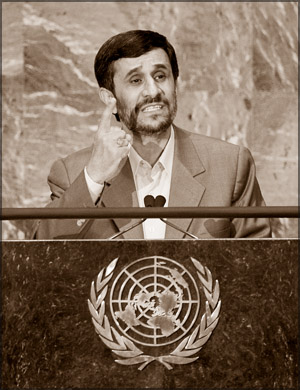Ahmadinejad: 'American empire' nearing its end
In a blistering speech before the United Nations General Assembly,
Iranian President Mahmoud Ahmadinejad blamed "a few bullying powers" for
creating the world's problems and said the "American empire in the world
is reaching the end of its road."
And while he insisted Iran's nuclear activities are peaceful,
Ahmadinejad blamed the same powers for seeking to hinder it "by exerting
political and economic pressures on Iran, and threatening and
pressuring" the International Atomic Energy Agency.
|

Mahmoud Ahmadinejad, President of the Islamic Republic of
Iran speaks during the 63rd session of the United Nations
General Assembly at the United Nations in New York September
23, 2008. AFP |
Those powers, meanwhile, are building or maintaining nuclear
stockpiles themselves, unchecked by anyone, he said.
As Ahmadinejad spoke, the only person at the United States table was
a note-taker; no U.S. diplomat was present. When President Bush spoke
earlier Tuesday, however, Ahmadinejad was in the room.
"As long as the aggressors, because of their financial, political and
propaganda powers, not only escape punishment, but even claim
righteousness, and as long as wars are started and nations are enslaved
in order to win votes in elections, not only will the problems of the
global community remain unsolved, but they will be increasingly
exacerbated," the Iranian leader said.
He accused the United States of oppressing Iraqis with six years of
occupation, saying Americans were "still seeking to solidify their
position in the political geography of the region and to dominate oil
resources."
Meanwhile, he said, Palestinians have undergone "60 years of carnage
and invasion ... at the hands of some criminal and occupying Zionists."
He said Zionists in Israel "have forged a regime through collecting
people from various parts of the world and bringing them to other
people's land, by displacing, detaining and killing the true owners of
that land."
The Security Council, he said, "cannot do anything, and sometimes
under pressure from a few bullying powers, even paves the way for
supporting these Zionist murders."
He stopped short of calling for Israel to be politically wiped off
the map as he has in the past. He called for "a free referendum in
Palestine for determining and establishing the type of state in the
entire Palestinian lands."
Ahmadinejad pointed to what he said are signs of hope, saying an
increasing number of nations are turning their backs on "the bullying
powers" and seeking to establish new relations.
"Today the Zionist regime is on a definite slope to collapse," he
said.
The Anti-Defamation League released a statement saying the Iranian
leader showed he "is deeply infected with anti-Semitism" and displayed
"the true threat the Iranian regime poses to Israel, the United States
and the West."
Hours before Ahmadinejad's speech, Bush told the General Assembly
that Iran was among the nations that "continue to sponsor terror."
"Yet their numbers are growing fewer, and they're growing more
isolated from the world," Bush said.
Bush also said U.N. members needed to enforce sanctions against Iran
for failing to suspend its nuclear program, which the United States and
other Western nations believe is intended to develop nuclear weapons.
Before Ahmadinejad spoke to the U.N., he told CNN's Larry King that
he is willing to meet with presidential candidates Sens. John McCain and
Barack Obama -- even in front of the media -- to discuss world issues
and debate.
But he has no preference between the two, he said in the interview
that aired Tuesday night on "Larry King Live."
"We believe that these are issues relating to the domestic affairs of
the United States," Ahmadinejad told Larry King of the presidential
race, according to a transcript of the interview.
"And decisions pertaining to that must be made by the American
people. And it's not important to us either," Ahmadinejad said. "What
matters essentially is that the president that is chosen by the American
people should adopt a path and a policy approach and for us to observe
the policy approach.
"This is the campaign period, anyone can say anything. So we
disregard that. What matters is that once someone is in office, we have
to watch and see if that person will bring about some changes in policy
or continue the same old path."
Ahmadinejad was in New York City for the United Nations General
Assembly meeting, which began Tuesday.
"I have said that, in fact, on this very trip, currently in New York,
that I am ready to speak with the presidential candidates before the
press," he told Larry King. "I believe that we've really done whatever
we could do in this respect."Asked whether he fears a U.S. attack,
Ahmadinejad told King that attacking Iran would be the "worst thing the
U.S. government can do ... I think that in the United States, there are
enough reasonable people, smart people, who would not allow the U.S.
government to make such a big mistake."
Withdrawal of U.S. troops from Iraq, meanwhile, would be "the best
scenario," Ahmadinejad said. "But I think that it needs a timetable ...
the presence of the United States there has not reduced tension and it
has not limited terrorism either. In fact, it has increased terrorism."
-CNN
|
